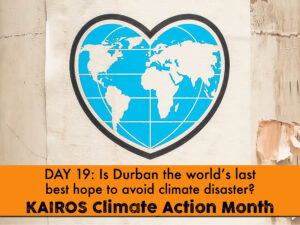From the archives: Is Durban the world’s last, best hope to avoid climate disaster? #KAIROSClimateAction

As we enter Global Climate Justice Week, we look back 10 years ago to COP17 in Durban, South Africa. In the KAIROS Briefing Paper Is Durban the world’s last, best hope to avoid climate disaster?, John Dillon and Jim Davis analyze the outcomes of previous climate talks and Canada’s inadequate climate policies within a larger context of ecological debt. As the paper states, “The Global North’s over-appropriation of the Earth’s carbon absorption capacity has built up an enormous ecological debt to the peoples of the Global South and to all living beings in the Earth community.” What has been done to address this debt in the last ten years?
The paper opens with a powerful quote from Bolivian Indigenous leader Rafael Quispe:
“Our Mother Earth is ill. The development model of unlimited economic growth and overconsumption has broken the balance between human beings and the environment. The current proposals on the table in the negotiations are not enough to stop climate change. We propose the model of living well in harmony with Mother Earth as the way forward to re-establish the balance between humans and nature.”
Even a decade ago, this paper and the words of Rafael Quispe underscored the growing intensity of climate change and the need for decisive measures before it is too late. There was a hope then that COP17 would put UN Climate change talks back on track after failed attempts at progress at COP15 in Copenhagen and COP16 in Cancun. Ten years later, the world is putting the same hope in COP26 in Glasgow after delayed talks in 2020 because of COVID19 and the failure of leadership at COP25 in Madrid in 2019.
Perhaps there are other places to lay our hopes for the transformation we need? What can we learn from the words in this paper from ten years ago? The paper concludes that Indigenous peoples’ vision of “living well” can be a guide as we embrace a sustainable economy where all people live within the Earth’s biophysical limit, sharing in the Creator’s gifts and opportunities to care for one another. Let us hope it does not take another ten years for this idea to take hold.








